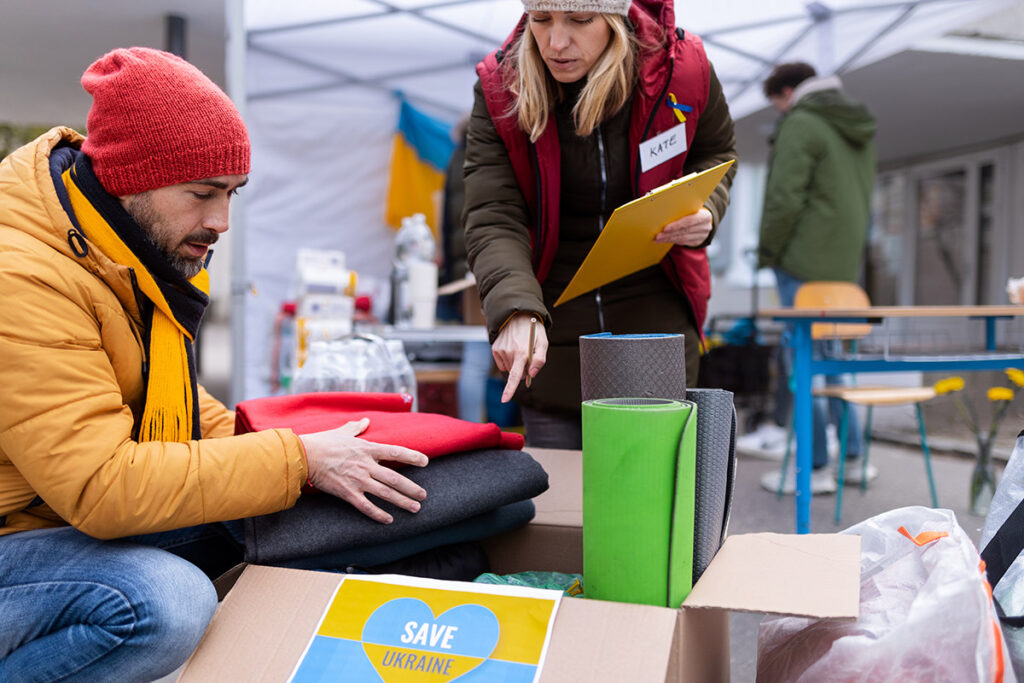The war in Ukraine shows humanity at its worst and at its best. While it is humans who cause the suffering, many also step up, reach out, and volunteer to help those in need.
Charlotte Traeger
Postdoctoral research fellow, Hertie School of Governance
Debbie Haski-Leventhal
Associate Professor in Management, Macquarie Graduate School of Management
Kerstin Alfes
Professor of management, ESCP Business School
In Lviv, Western Ukraine, Artem Mokrenet left his job as an interior designer to help refugees at the Ukrainian border, the Australian outlet ABC reports. At night, he dons a yellow vest and provides guidance to those searching for trains out of danger zones. Other volunteers strive to supply food, clothing, blankets, or free car rides, sometimes at the risk of their lives.
A world running on good deeds
While the situation in Ukraine is exceptional, volunteers’ non-remunerated presence is not. In 2021, more than 860 million adults over the age of 15 volunteered every month across the globe, according to the United Nations. This equals over 100 million full-time employees worth 1.348 trillion US dollars, or 2.4% of the entire global economy.
Heavily dependent on volunteers, non-profit organisations (NPOs) must ensure their workforce is satisfied of their experience if they are to retain them.
Research into how to manage volunteers is one route to guarantee they stay onboard during the global refugee crisis. Scholars investigating the experience of Syrian and Afghan refugees in Germany have called to adopt “unconventional management approaches” to speed their integration.
Of particular interest in this respect is research on organisation socialisation, or the process by which an individual comes to appreciate the values and behaviours of the organisation for which they work, moving from outsider to insider.
The risk of emotional exhaustion
A study that we published in April 2021 in the journal Human Relations can shed light on the current situation in the Ukraine. It was the first large-scale qualitative study to examine volunteers’ socialisation in the context of refugee help. Based on 42 in-depth interviews, it delves into the experiences of volunteers in three organisations working with refugees and migrants in France and four in Australia.
The volunteers’ work was varied. Some provided legal advice on obtaining refugee status or a home in their host country, while others delivered goods and furniture, provided sports training or school support for children. Given the challenging context, many volunteers grappled with emotional challenges. One, who worked several days a week helping refugees, expressed frustration at seeing the number of those in need continuing to rise. Others feared not knowing how to support them or react in difficult situations.
Our study reveals non-profit organisations can reduce their workforce’s stress levels by paying particular attention to their well-being during the stage of onboarding. Referred to in managerial psychology as the entry phase, it can make or break a volunteer’s ability and determination to stay within an organisation.
How to master the stage of onboarding: a guide
We found there are three concrete actions that NPOs can take to ensure that the entry phase is successful.
- Provide training activities and content that support role learning and self-reliance – for example, some organisations showed films on refugees’ typical journeys and the challenges they faced. A detailed observation phase, done face to face or online, can help address volunteers’ needs and expectations, reduce stress and become effective faster. Role playing exercises also boosted workers’ confidence.
- Hold both formal and informal meetings with team members to enhance team cohesion. Formal meetings could be a weekly lunch with the team, while informal ones, such as sharing a bus ride, are equally important. NPOs need to find creative ways to include volunteers in the socialisation process and build connections within the team and to the organisation itself.
- Make professional psychologists available to provide emotional support to volunteers when needed. This is not a necessarily a mandate for an in-house psychotherapist. Instead, NPOs can creatively tap into external resources, such as by partnering with organisation to assist distressed volunteers. For example, one Australian organisation involving university students in helping refugees collaborated with campus support to offer such services.
When the above actions were taken, volunteers became more skilled at supporting refugees while protecting their own well-being. One volunteer told us:
“When I first started, I was a little withdrawn because I did not really understand how it all worked and did not want to do anything I was not meant to do, but I am getting more confident.”
Lessons for Ukraine’s volunteers
Our findings may speak directly to volunteers currently working around the clock to support Ukrainian refugees. When assisting those facing displacement, the loss of loved ones, and an unknown future, volunteers also need to be aware of the emotional challenges they face, including frustration, stress and even fear.
Training sessions, events, and informal and formal meetings can all help take the edge off volunteers’ experience. In the long run, workers reap the benefits of a higher sense of self-reliance, social cohesion with their peers, and organisational belonging.
This article was originally published by The Conversation under the Creative Commons licence.
